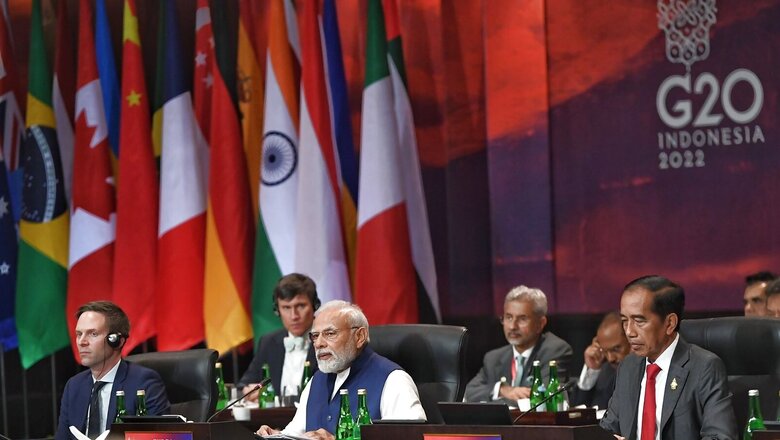
views
The global community is keenly looking towards India, as we commence the G20 presidency. The global landscape has witnessed a phenomenal emergence of India as a key player. This transformation is not limited to mere external repositioning but also on the domestic front. The past eight years have been marked by profuse policy measures and groundbreaking reforms in infrastructure, social security, diplomacy and economic frameworks amongst others. India is vigorously emerging out of the colonial setbacks that we had been holding onto, even after 1947. Today, we are well-positioned to offer solutions to the world including the developed countries, as we had once been doing in the past.
For the challenges the world is facing now, India has a significant offering which is time-tested and independent of contradictions. Our ethos is captured in this idea of Antyodaya, which asserts that the last man in society is at the centre of policy decisions and economic ideas for the policymakers.
Antyodaya is a pragmatic school of thought which is not utopian in books but effective in practice. It resonates with Mahatma Gandhi’s idea of development, Sarvodaya, wherein he emphasised the development of all, through the most vulnerable ones. By infusing civilisational learnings and the need of the subcontinent, Antyodaya was first propounded in the 1960s as statecraft by Pt. Deendayal Upadhyay. He proposed that “the success of economic planning and economic progress will not be measured through those who are at the top of the society’s ladder, but through the people at the lowest rung of the society.”
Antyodaya is not a single policy, but rather an approach to outline the decisions in state functions. And it is a thought process to be imbibed in the minds and hearts of policy professionals, lawmakers and executives to achieve the desired objectives. Contrary to its contemporary school of thought, Antyodaya does not have a world view of conflict or superiority of one class against another. Rather, it drives an integrated approach and action to regulate the affairs of the state. As promised in the election manifestos, Antyodaya is the guiding light of the Modi government’s policies. With technology, transparency and innovation, the Antyodaya policies have yielded unprecedented results.
The digital revolution in India has awestruck the world. From cost-free UPI payments to Jan Dhan-Aadhaar-Mobile (JAM) trinity, India has surpassed the financial inclusion records. BharatNet connecting all Gram Panchayats, cheap 4G services and the development of indigenous 5G is changing the entire accessibility discourse of the country. Good governance policies like Ujjwala Yojana, Pradhan Mantri Awas Yojana, PM Jan Aarogya Yojana, Standup India and reservation for Economically Weaker Sections (EWS) are exemplary social security measures. These schemes aim to empower the weaker sections of society by extending adequate support rather than disrespecting the potential of citizens by offering them freebies.
Entitlement of voting rights to the Dalit Valmiki community in Jammu & Kashmir, passing of the Citizenship Amendment Act, 2019 to protect persecuted minorities, and robustly integrating the Northeast with other parts of the country are a few in the long list of measures undertaken to mainstream the neglected fellow citizens. From empowering youth and women under Pradhan Mantri Mudra Yojana (PMMY) which transforms job seekers into job generators, to ensuring social security for labourers across India, the aspirations of last mile persons are rising. It is the Antyodaya lens that has made the government understand and address the plight of everyone and not leave anyone behind.
At the international level, the Antyodaya approach is an appropriate tool to realise our belief in Vasudhaiva Kutumbakam (The World Is One Family). The world has witnessed and organisations like the United Nations and World Health Organisation have praised India’s Vaccine Maitri programme efforts. The selfless supply of vaccines as grants to smaller countries like Bahamas, Belize, Grenada, Guyana, Jamaica, Haiti, Suriname, Oman and Pacific Island states amongst many others during distress amazed the world. The SAGAR (Security and Growth for All in the Region) policy, envisioned by Prime Minister Narendra Modi, is an assurance of security and prosperity to all the stakeholders in the Indo-Pacific region. Our decisions to extend support were not dependent on our geopolitical interests, but rather prioritised on a need basis of the receiving countries. The Antyodaya thought process has played a significant role in changing the colonial mindset that distinguishes between the rulers and their subjects. It effectively establishes a connection between the decision-makers and its remotest standing responsibility.
For the next 10 months, India will host nation heads, senior functionaries and representatives of G20 countries. Churning of ideas and quest for sustainable solutions will take place in 11 primary engagement groups including civil society, youth, women, parliaments, think tanks, and science. Various task forces on different agendas and other engagements will brainstorm on the best measures for mankind. Representatives from G20 countries will be hosted in over 60 cities with 100+ meetings and events.
This fantastic opportunity to present our solutions and contribute to the betterment of humanity is summed up by our prime minister in the following quoted words: “The need of the hour is to show concrete and collective resolve to ensure peace, harmony and security in the world. I am confident that next year when the G20 meets in the holy land of Buddha and Gandhi, we will all agree to convey a strong message of peace to the world.”
Tejasvi Surya is a Member of Lok Sabha and national president of Bharatiya Janata Yuva Morcha, BJP’s youth wing; Suyash Pande is an Advocate at the Supreme Court. Views expressed are personal.
Read all the Latest Opinions here


















Comments
0 comment